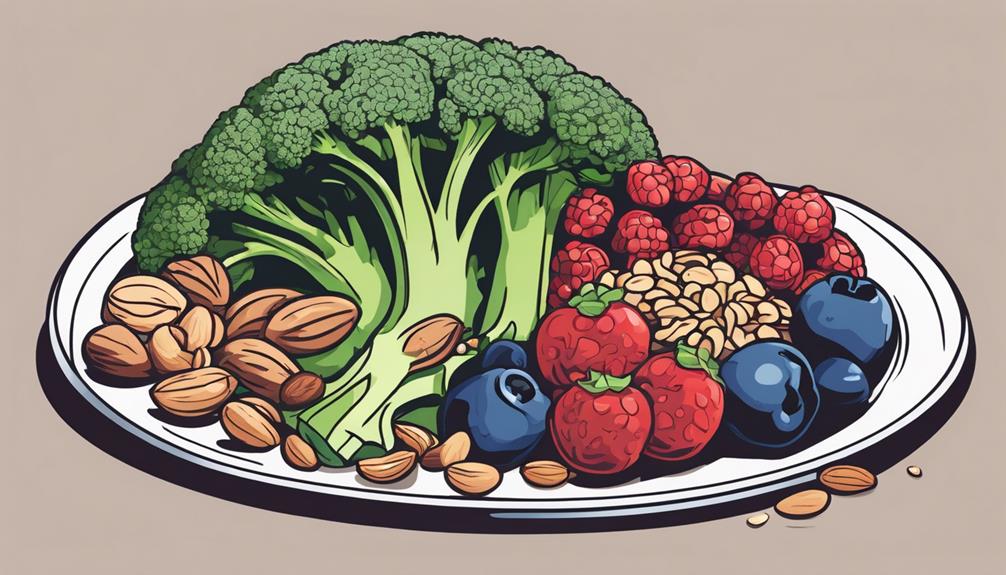When it comes to managing type 1 diabetes, navigating dietary adjustments can seem complex yet crucial. Balancing your meals, especially in terms of carbohydrate intake, can significantly impact your blood sugar levels.
But that's just the beginning. By incorporating fiber-rich foods and lean proteins while limiting sugary treats, you can make substantial strides in managing your condition effectively.
But what about the finer details of crafting a diabetes-friendly diet that suits your lifestyle and health goals?
Key Takeaways
- Balance meals with lean proteins, fiber-rich foods, and controlled carbohydrates for effective Type 1 Diabetes management.
- Monitor carbohydrate intake, practice portion control, and consult a dietitian for personalized guidance.
- Choose whole foods over processed options to maintain stable blood sugar levels and overall health.
- Limit sugary treats, opt for sugar substitutes, and explore sugar-free dessert alternatives for better diabetes control.
Importance of Balanced Meals

Emphasizing the consumption of balanced meals plays a crucial role in managing Type 1 Diabetes effectively. Portion control and meal planning are integral components of maintaining stable blood sugar levels. When you have Type 1 Diabetes, understanding the impact of different food portions on your blood glucose is essential. By carefully monitoring the amount of food you eat, you can better manage your diabetes and prevent sudden spikes or drops in blood sugar levels.
Meal planning is a key strategy for individuals with Type 1 Diabetes. Planning your meals in advance allows you to make healthier choices and control your carbohydrate intake more effectively. It also helps in ensuring that you get the right balance of nutrients necessary for your overall well-being. When planning your meals, consider including a variety of foods from different food groups to ensure you're getting all the essential vitamins and minerals your body needs.
Monitoring Carbohydrate Intake
Monitoring your carbohydrate intake is a fundamental aspect of effectively managing Type 1 Diabetes. By practicing portion control and being mindful of the glycemic index of the foods you consume, you can help regulate your blood sugar levels more efficiently. Portion control involves being aware of how much carbohydrate you're consuming in each meal and snack. This can help prevent drastic spikes or drops in blood sugar levels. Additionally, considering the glycemic index of carbohydrates can guide you in choosing foods that have a slower impact on blood sugar levels, promoting more stable glucose control.
When monitoring your carbohydrate intake, focus on whole foods like fruits, vegetables, whole grains, and legumes. These foods typically have a lower glycemic index and provide essential nutrients. Remember to read nutrition labels, measure serving sizes, and track your carbohydrate intake to maintain a balanced diet that supports your diabetes management. Consulting with a registered dietitian can also help tailor a carbohydrate intake plan that suits your individual needs and lifestyle.
Emphasizing Fiber-Rich Foods

Incorporate a variety of fiber-rich foods into your daily meals to support your overall health and blood sugar management as part of your Type 1 Diabetes management plan. Fiber benefits individuals with Type 1 Diabetes by improving blood sugar control, promoting satiety, and aiding in digestion. Including healthy choices like fruits, vegetables, whole grains, legumes, nuts, and seeds can significantly impact your well-being.
Fiber-rich foods help regulate blood sugar levels by slowing down the absorption of glucose, preventing spikes that can be problematic for individuals with diabetes. Additionally, they contribute to a feeling of fullness, which can assist in weight management—a crucial aspect of diabetes care. Opt for whole fruits instead of fruit juices, choose whole grains like quinoa or brown rice over refined grains, and incorporate beans and lentils into soups or salads for added fiber content.
Incorporating Lean Proteins
Including lean proteins in your diet can play a crucial role in managing Type 1 Diabetes effectively. When incorporating lean proteins into your meals, choose options that are low in saturated fats and calories while being rich in essential nutrients. Here are some key points to consider:
- Protein sources
- Opt for lean meats such as skinless poultry, fish, and lean cuts of beef or pork.
- Incorporate plant-based proteins like tofu, legumes, and quinoa into your meals for variety and added fiber.
- Include dairy products like low-fat yogurt and cheese for calcium and protein content.
- Meal planning
- Plan your meals ahead to ensure a balanced intake of proteins, carbohydrates, and fats.
- Consider portion control to manage blood sugar levels effectively throughout the day.
Limiting Sugary Treats

To effectively manage Type 1 Diabetes, it's crucial to be mindful of your consumption of sugary treats. While it's tempting to indulge in sugary desserts and snacks, they can cause rapid spikes in blood sugar levels, making diabetes management challenging.
Instead of completely cutting out sweets, consider using sugar substitutes like stevia or erythritol in your recipes. These alternatives can satisfy your sweet tooth without causing significant spikes in blood sugar.
Incorporating healthy swaps can also help you enjoy treats in a more diabetes-friendly way. Opt for fresh fruits like berries or a small piece of dark chocolate instead of traditional high-sugar desserts. You can also experiment with sugar-free dessert recipes that use ingredients like almond flour or coconut oil to create delicious treats without the harmful effects of excessive sugar.
Frequently Asked Questions
Can Individuals With Type 1 Diabetes Still Enjoy Occasional Cheat Meals or Indulgent Treats?
You can still enjoy occasional cheat meals or indulgent treats with Type 1 Diabetes. By strategizing cheat meals wisely and balancing treats with healthy choices, you can indulge without compromising your health goals. Moderation is key.
How Does Alcohol Consumption Affect Blood Sugar Levels for Those With Type 1 Diabetes?
When it comes to managing type 1 diabetes, alcohol consumption can impact blood sugar levels. Moderation is key for diabetes control. Be mindful of how drinks affect you. Balance is crucial for staying healthy while enjoying a social drink.
Are There Any Specific Vitamins or Supplements That Individuals With Type 1 Diabetes Should Consider Incorporating Into Their Diet?
Consider incorporating vitamin D, omega-3 fatty acids, and magnesium supplements into your diet to meet specific nutritional needs. These supplement options can support overall health and potentially aid in managing type 1 diabetes.
How Does Stress or Lack of Sleep Impact Blood Sugar Levels and Overall Diabetes Management?
When stress hits, your blood sugar can spike due to hormonal changes. Prioritize stress management techniques like deep breathing or meditation. Lack of sleep disrupts insulin sensitivity, so aim for quality rest to support your diabetes management.
What Are Some Practical Tips for Dining Out or Socializing With Friends While Managing Type 1 Diabetes?
When dining out or socializing, plan ahead by checking menus, opting for grilled or baked items, and watching portion sizes. Seek social support from friends who understand your dietary needs. Enjoy meals mindfully and don't hesitate to ask questions.
Conclusion
In conclusion, managing type 1 diabetes through dietary adjustments is crucial for maintaining blood sugar levels. By focusing on balanced meals, monitoring carbohydrate intake, emphasizing fiber-rich foods, incorporating lean proteins, and limiting sugary treats, individuals can better control their diabetes.
Remember, your diet is a powerful tool in managing your health, so make smart choices to fuel your body properly. Your commitment to a healthy diet can be a game-changer in managing your diabetes effectively.